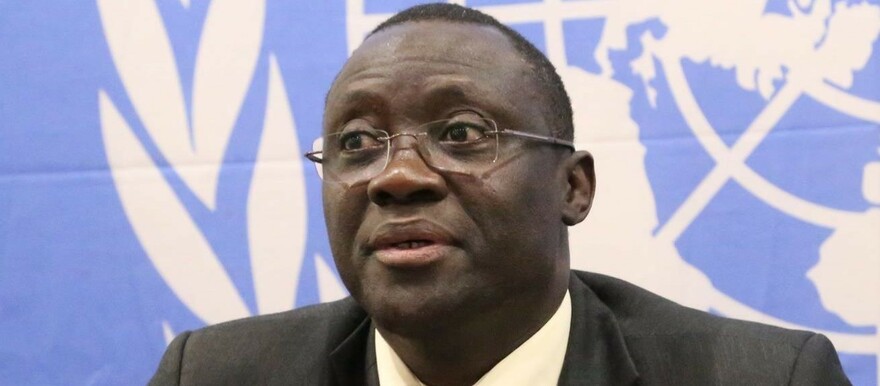Musa Gassama, a senior UN official has urged the South Sudanese government to address the concerns raised by different parties over the recently reconstituted institutions.
Gassama made this statement at the 33rd R-JMEC Plenary in Juba on Thursday, on behalf of Special Representative Nicholas Haysom.
“I encourage the Government to urgently and amicably address the concerns raised by different parties related to the reconstitution.”
Last week, President Salva Kiir Myardit reconstituted the three entities and appointed officials to lead them.
In a decree read on the state-owned television, South Sudan Broadcasting Corporation, Kiir reconstituted the National Elections Commission (NEC) and reappointed the incumbent chairperson, SPLM’s Prof. Abednego Akok Kacuol.
He also appointed South Sudan Opposition Alliance’s (SSOA) Michael Yabagayo as NEC deputy chairperson and Mac Maika Deng, a civil servant, was retained as the Chief Electoral Officer.
In its reaction to the decree, the SPLM-IO, a principal party to the peace agreement, said it was not represented in the top leadership of the newly reconstituted electoral body.
Also, there were concerns raised by civil society organizations over the lack of women’s representation in the reconstituted commissions, saying the presidential decree disregarded the 35% affirmative action stipulated in the peace agreement for women representation in leadership and governance.
In his statement, Gassama stressed the importance of securing the support of all parties for a collaborative way forward. He emphasized that the credibility of these bodies hinges on establishing public trust and confidence in them from their inception.
Gassama also drew attention to the issue of limited women’s participation, asserting, “Additionally, the limited participation of women must be addressed, and a clear plan should be developed to expedite their operationalization so as to ensure these institutions are adequately resourced and have the required capabilities to deliver on their critical mandates.”
Shifting focus to the upcoming elections in December 2024, the UN official emphasized the urgency of making technical, legal, and operational decisions as the electoral architecture takes shape.
“With the electoral architecture beginning to take shape, technical, legal and operational decisions are urgently needed to enable the elections to take place in December 2024.” Furthermore, he highlighted the readiness of the UN to provide technical assistance as part of the Trilateral mechanism, which leverages the combined comparative advantages of the UN, IGAD, and AU,” he said.
“After our recent meeting, I engaged in positive discussions in South Africa and Kenya, aiming to garner regional support for South Sudan’s peace process. Additionally, I had the opportunity to engage in discussions with First Vice President Machar about the implementation of the Revitalized Peace Agreement. During these talks, I emphasized the necessity of showcasing progress to ensure the scheduled culmination of the transition period with free, fair, and peaceful elections. This message was conveyed to all stakeholders and partners, including President Kiir,” he added.
Expressing concern about the crucial need for a safe and secure environment for free, fair, and credible elections, Gassama noted delays in finalizing the Transitional Security Arrangements.
Urging the expedited deployment of the first batch of graduated forces and the initiation of Phase II, he emphasized the importance of adequate logistical and political support for security sector reform.
Highlighting ongoing security and political tensions across the country, Gassama cautioned against overlooking these issues as the electoral date approaches. He underscored the detrimental impact of military defections, describing them as a toxic practice that undermines the spirit and intent of the Revitalized Peace Agreement, contributing to mistrust among parties.
“As of 6 November, over 363,000 individuals have arrived in South Sudan due to the conflict in Sudan. I commend the support offered by President Kiir and his government to the signatories of the Juba Peace Agreement and in the regional efforts to initiate a political process that will lead to a way out of the current conflict,” he said.
“I applaud South Sudan’s efforts in receiving arrivals, but I express concern about the dire humanitarian situation affecting the 9.4 million South Sudanese in need of assistance,” added.
He highlighted the strain on host communities in Akobo, where approximately 17,000 returnees from Gambella have added additional challenges. Gassama emphasized the necessity for support from international donors to address multiple emergencies’ impact. Additionally, he underscored the government’s responsibility in allocating sufficient funding to meet its humanitarian and public service obligations.
Drawing the attention of the peace partners to the alarming surge in reports documenting the recruitment of children by armed forces and groups, specifically in Western Equatoria State, he said: “I urge the parties to adhere to their obligations to protect children during armed conflict, especially refraining from recruitment and use of children amongst their ranks in the lead-up to the redeployment of unified forces and the upcoming elections.”
“The clock has not stopped ticking. With 13 months until December 2024, the parties must engage in frank dialogue to reach a consensus on the way forward, which will require political and procedural compromises. I urge the parties to demonstrate political will, pragmatism and leadership by increasing their efforts to regain the trust of citizens and to encourage the international community’s goodwill to invest in the South Sudanese peace project,” he explained.




